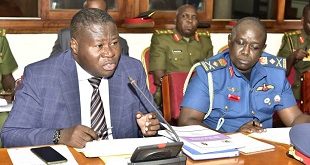
Kampala, Uganda | THE INDEPENDENT | International Lands Researcher says Africa could reap economic dividend from modernizing its land administration.
The Ugandan land Expert with the World Bank, Frank Byamugisha says the momentum is building up to modernize land administration in Africa and that the reforms could propel the continent to prosperity.
At least 25 African countries including Uganda are implementing land administration have ongoing programmes to modernize their land administration system.
Byamugisha, delivered a keynote address at the International Conference on the implementation of land information systems taking place in Entebbe Uganda.
The conference attended by land experts and manager from several African countries was part of the activities to end a ten-year World Bank funded land administration project. French Company GN FI had been contracted to establish country wide – a system known as the Design, Supply, Installation and Implementation of National Land Information System Infrastructure(DeSINLISI).
Uganda has been among the many countries across Africa that have been using manual processing of land requests and land registration among others.
The old system of manual registries had been blamed for delays and errors which experts say had undermined the effectiveness of administering and securing property rights for citizens or land landowners.
A World Bank study had showed that the average duration for title registration in Uganda for so many years was 270 days (9months). With the new system, you will no longer have to travel to the Lands Ministry headquarters in Kampala for land registration and related matters.
Twenty-two Ministerial Zonal offices have been installed and linked to the national land information system in areas of Wakiso, Mukono, Kampala, Masindi, Kibaale, Kabarole , Mbarara, Arua, Gulu, Lira, Mbale and Jinja, Mpigi, Luwero, Mityana, Kabale, Rukungiri, Tororo, Moroto and Soroti.
One of the major financial benefits of the new system according to the Lands Ministry is the increase is an increase in revenue generation with over 710 billion shillings generated between February 2013 to June 2019. The cumulative effect of the project reportedly represents 269% return on Investment of the US$72 million investment provided as a World Bank loan.
Byamugisha said countries in Asia and Europe were able to transform their economies by strengthening their property rights particularly land administration.
The Asian countries, China, Taiwan and South Korea according to Byamugisha have become industrialized, enjoy shared prosperity and have virtually eliminated extreme poverty by strengthening their property rights.
He said research by the World Bank and other scholars have found that strengthened and protected land rights in the last fifteen years in Ethiopia have generated investment growth and productivity.
Ethiopia and Rwanda have strengthened and protected their land rights through nationwide programmes of land certification and administration.
They have also deployed a wide range of technology packages including ICT remote sensing especially satellites, internet and mobile phones. The two countries according to Byamugisha have also reduced transaction costs, time and have linked their land data with other national data systems.
He said other African countries have embraced modernization especially by computerizing land administration systems. Some of the experts in land administration have expressed concern that Uganda’s land tenure system characterized by different land tenures could be a hindrance to attaining the results posted by Rwanda and Ethiopia cited in Byamugisha’s address.
One of the challenges according to Hamza Galiwango of the Uganda Investment Authority land division is how to title and register communally owned land.
Moses Kibirige, the head of the World Bank’s Trade and Competitiveness sector in Uganda said part of the solution to communal land ownership in Uganda is to have it communally registered and titled.
He decried the fact that about 80% of the land in Uganda is not titled yet land can be used as one of the avenues to create the need 500,000 jobs annually.
Kibirige says their studies show that good land governance can eradicate land grabbing, encourage agriculture, and increase food security—transforming development prospects.
******
URN
 The Independent Uganda: You get the Truth we Pay the Price
The Independent Uganda: You get the Truth we Pay the Price


